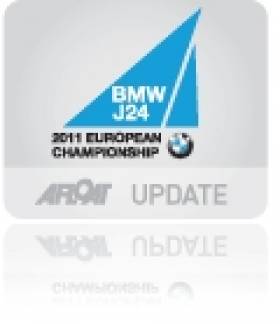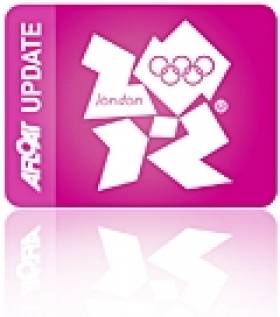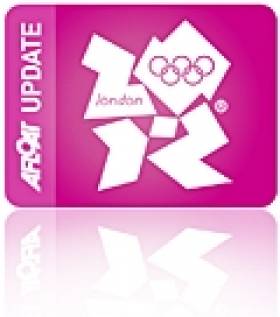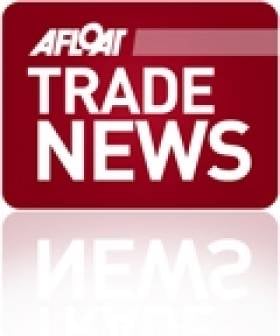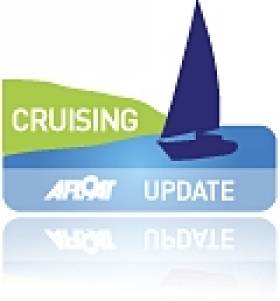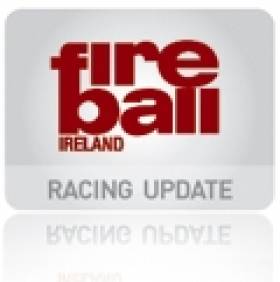Displaying items by tag: European
J24 Euros Open in Howth, Strong Winds Cancel Practise Race
The BMW J/24 European Championships were officially opened last night with a ceremony on the forecourt in front of the Howth Yacht Club clubhouse on the podium erected by the sponsor but a practise race scheduled for this afternoon was cancelled due to strong winds.
Last night's openning ceremony featured two top-of-the range BMW vehicles and a motorcycle and a backdrop with the highly appropriate phrase of 'Joy is Plain Sailing' in front of the national flags of the nine competing nations.
With an audience of competitors, supporters and club members, the speakers on the podium were introduced by the 'Master of Ceremonies', Club and Championship Press Officer Graham Smith.
First to speak was Derek Bothwell, Chairman of the Championship Organising Committee, and then the Commodore Roger Cagney addressed the large crowd who has assembled on the forecourt and balcony. They were followed by John Ives, Managing Director of BMW Ireland, the title sponsors, who spoke about BMW's global involvement in sailing, and then Niamh McCutcheon, President of the Irish Sailing Association, spoke on behalf of the ISA and the Irish Sports Council who supported the event.
Jim Farmer, President of the World Council of the International J/24 Class Association, spoke next, and the final speaker was the Mayor of Fingal, Cllr.Gerry McGuire, who welcomed all the overseas visitors to the county and officially declared the Championship open.
40 Knot Winds Cancel Star Racing in Dun Laoghaire
Italians Lead, O'Leary/Burrows Third in Star Europeans
Ireland's Peter O'Leary and David Burrows lie third and only six points off the overall lead held by Italian's Diego Negri and Enrico Voltolini after the first two races of the Star European championships in Dun Laoghaire.
The staging of the Contintental Championship of the Olympic Class, in which Ireland has reasonable aspirations of taking an Olympic medal next year, is being run by the Royal St. George Yacht Club under Howth race officer David Lovegrove.
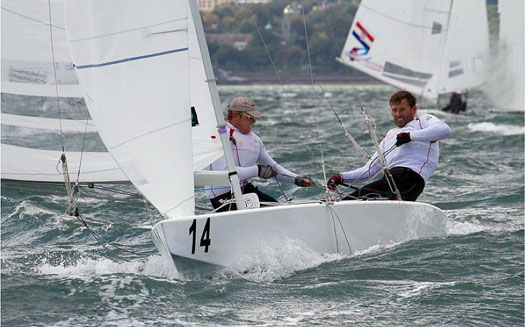
Star racing in big breeze on Dublin Bay yesterday. Photo: Gareth Craig. More pics on the Afloat Gallery here.
Ireland's other entry in the 27-boat fleet, Max Treacy and Anthnoy Shanks, of the host club lie 12th.
Second overall is France's Guillaume Florent and Pascal Rambeau. Britian's double Olympic gold medallists Iain Percy and Andrew Simpson, despite leading the first race for a time this afternoon, have posted an eighth and a seventh to lie eighth overall.
Racing on Dublin Bay continues tomorrow – under the threat of gales – until Friday.
Italians Negri and Voltolini delivered two consistent results of a race win and a second place in the 27-boat fleet from 17 nations.The Italians leaders were the 2006 European champions and overcame challenging post-frontal weather conditions that delivered 20-degree wind-shifts at times on an otherwise smooth race course off Seapoint on the south shore of Dublin Bay.
France's Guillaume Florent and Pascal Rambeau also had a consistent day with a second and third while the home fleet delivered a strong showing as Olympic veterans
Star European Championship 2011 at Royal St. George YC, Dun Laoghaire, Ireland
(Provisional overall standings after two races):
1st ITA Diego Negri & Enrico Voltolini
2nd FRA Guillaume Florent & Pascal Rambeau
3rd IRL Peter O'Leary & David Burrows
4th FRA Xavier Rohart Pierre & Alexis Ponsot
5th CAN Richard Clarke & Tyler Bjorn
6th POR Afonso Domingos & Frederico Melo
Simon Coveney Appointed Marine Minister
Cork sailor Simon Coveney (38) has been appointed as Minister of Agriculture, Food and Marine in the new cabinet of the Fine Gael/Labour Government formed yesterday.
The announcement has been welcomed by various marine interests pleased to see Marine back at the cabinet for the first time since the Department was dismantled by Fianna Fail's Bertie Ahern in 2002.
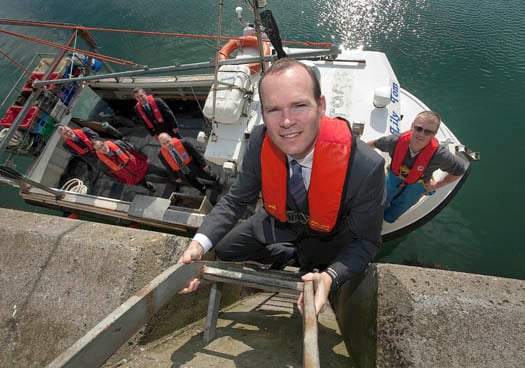
Marine Minister Simon Coveney TD
The appointment means Taoiseach Enda Kenny has kept good an election promise to reinstate the Marine department. A decade of lost opportunties has meant the sector has suffered through lack of infrastructure and coastline planning.
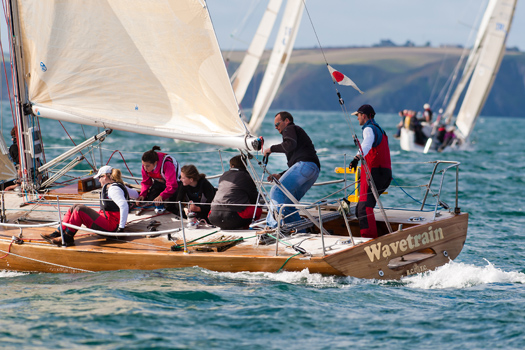
Simon Coveney at the helm of his yacht Wavetrain. Photo: Bob Bateman
"Simon is someone who understands the Sea as a sailor himself but also in his work as an MEP where he was involved in a number of major European maritime projects. This is a great opportuinty for the Marine. We look forward to working with him to develop this untapped resource." said David O'Brien of the Irish Marine Federation.
Simon was first elected to the Dáil in 1998 as one of Fine Gael's youngest TD's aged 26. He replaced his father Hugh Coveney TD following his untimely death.
Simon follows his father in to the post of Marine Minister. Hugh held the post in 1994.
Simon holds a B.Sc. in Agriculture and Land Management from Royal Agriculture College, Gloucestershire. He was also educated at Clongowes Wood College, County Kildare; University College Cork, and Gurteen Agricultural College, County Tipperary.
A keen fan of all competitive sport he has worked as a sailing instructor at his club Royal Cork Yacht Club in Crosshaven and been involved in many sailing regattas.
In 1997/8 he led the "Sail Chernobyl Project" which involved sailing a boat 30,000 miles around the world and raising €650,000 for charity.
In 2006 he contributed to RTE's series The Harbour and in a memorable quote, the Cork TD and former MEP said: "When somebody asks me the question, what's the one thing that's special about Cork?, I'd say the harbour."
Conference Reveals State of Marine Leisure Industry
With boat sales falling by as much as 80%, marina business down 20%, retail sales in chandlery down up to 38%, insurance down 12.5% the marine industry in Ireland and Wales had to take some action to ensure the marine trade and leisure industry survives.
An unusual industry conference took place in Dun Laoghaire today and yesterday with the objective of understanding where the industry is right now and how it needs to act to ensure that it survives the downturn in our economies.
Over 125 marine businesses from both sides of the Irish Sea will be attending in what will be the largest marine leisure Industry gathering ever brought together.
A joint address was given by the Executive Director of the British Marine Federation, Howard Pridding and David O'Brien the Chairman of the Irish Marine Federation set the scene as to where the industry is on both sides of the Irish Sea.
The conference heard from 3 companies who operate in the sector. One from each region, North Wales, South Wales and Ireland who will share with the conference their experiences in the current economic climate on how they are surviving and thriving in the downturn. Business tactics that need to be deployed were explored with a leading business and innovation specialist from Wales together with joint talks by Visit Wales and Failte Ireland on the development of marine leisure tourism.
Leading economist Jim Power delivered a talk on the economic situation and when we might begin to see some consumer confidence return to our markets.
The Pembroke Coastal Forum told how they have managed their coastline and environment and how they have facilitated marine leisure tourism through proper marine spatial planning.
The conference is being organised by irish-sea.org and Ireland/Wales Interreg IV A Programme funded by the European Region Development Fund.
Irish-sea.org has three partners, North Wales Watersports, South West Wales Marine Federation and the Irish Marine Federation.
Cruising Association's MedNet Goes Global
The Cruising Association has just launched a new internet and email based net, which lets members cruising various regions of the world arrange meets, ask questions and receive answers about ever-changing local facilities and regulations.
It all started in 2000 as Mednet, a service for some 85 members cruising yachts and motorboats in the Mediterranean. MedNet 1 allowed one-to-one email communication but soon members wanted more, especially the ability to see the answers to other members' questions.
So MedNet 2 was born in Spring 2001, providing wider access to conversations. By Autumn 2003 MedNet 2 had moved to Yahoo Groups, but as membership increased mail traffic became too heavy for slow and expensive internet connections on boats. As a consequence MedNetLite was introduced for those with low bandwidth connections. By now 250 users were exchanging news about lay-up sites, marinas, restaurants, anchorages, provisioning, boatyards, itineraries and regulatory changes. But a good long-term record of all this data was missing.
So MedNet 3 was introduced in 2006, working as an email based forum within MyCA, the Cruising Association members-only intranet. There were still shortcomings. The system was passive, collecting e-mails and displaying them online. Inputs were only by email. By now, users had grown to 350, 10% of the Cruising Association's membership. Members cruising in other regions began asking for their own networks.
The time had come to upgrade so Version 4 was developed by a group of Cruising Association members with IT skills. This has just been launched for four regions; Mediterranean, Baltic, European Inland Waterways and 'Blue Water'. Members can join as many as they wish. They post and respond online, or by email. They can receive full or lite email messages or opt for no email, just tuning in online when they have Internet access. A full record of all these discussions is maintained online, making it easy to research topics and keep the Cruising Association's many members-only publications right up-to-date.
On MedNet recent discussions have included:
• The need for grey water holding tanks in Turkey
• The cheapest way of making cash withdrawals
• Marina costs in western Italy
• Recommendations for a rigger in Preveza
• How to watch British TV in the Med
• Places for winter storage ashore
It will be interesting to see the sorts of topics that the wider use of MedNet technology brings!
Smyth and Bradley 17th at Fireball Euros
As predicted the wind Gods had nothing to offer the Fireball fleet assembled in Pavlov, Czech Republic for their Class Europeans on the final day of sailing last Friday. They waited until the cut-off of 13:50 local time but nothing of substance emerged. That meant that the results as they stood last Thursday remained. The entry was 49 boats with GBR, IRL, SLO, SUI, BEL, GER, CZE, FRA, NAM represented. Fireball's next international event will be the Worlds in Sligo in June 2011.
1. Tom Gillard and Sam Brearey 15041 GBR
2. Tom Jeffcoate and Andy Thompson 15045 GBR
3. Jaroslav Werner and Pavel Winkler CZE 14809.
17. Louis Smyth and Cormac Bradley IRL 15007



























